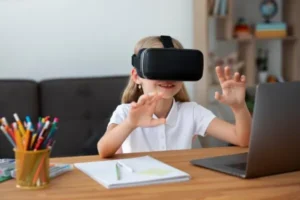The Education Blog

The Role of Self-Discipline in Lifelong Learning
Learning isn’t just for school anymore. In our fast-changing world, technology and industries keep evolving. Today, continuous self-improvement is both a personal responsibility and a professional imperative. But keeping up the drive to seek knowledge outside school needs more than curiosity; it needs self-discipline.
Lifelong learning is a commitment to growth that spans a lifetime. It involves consistently expanding your understanding, acquiring new skills, and adapting to change. At the heart of this journey is self-discipline. It’s the inner drive that turns intention into action. It changes fleeting interest into lasting skill.
This article looks at why self-discipline is key for lifelong learning. It shows how self-discipline drives personal growth and shares tips for building it into daily life.
Understanding Self-Discipline in Learning
Self-discipline means controlling your urges, staying focused on your goals, and pushing through challenges, even when there are no quick rewards. In learning, it means being there regularly, finishing tasks, and avoiding distractions to make progress.
It’s what keeps you:
- Reading the next chapter of a coursebook when you’d rather scroll through social media
- Practising a new skill even when results aren’t immediate
- Persisting through difficult topics that push you beyond your comfort zone
Discipline is what truly brings out intelligence and talent.
Why Self-Discipline Is Essential to Lifelong Learning
1. Learning Is No Longer Linear
The modern learner is not bound by school terms or institutional curricula. There are countless online courses, workshops, and self-guided materials. So, individuals need to decide and commit to their own learning paths.
Without structure imposed externally, self-discipline becomes the backbone of educational continuity.

2. Mastery Takes Time and Consistency
Short bursts of enthusiasm do not equate to mastery. No matter if you’re learning a language, coding, speaking in public, or gardening, consistent effort over time brings skill. Self-discipline helps establish habits that prioritise steady progress.
3. Overcoming Frustration and Plateaus
All learners encounter roadblocks—concepts that don’t click, skills that don’t develop quickly, or moments of self-doubt. Self-discipline helps you push through these periods without giving up.
It also enables reflection: stepping back, recalibrating, and approaching challenges with renewed strategy.
4. Balancing Learning with Life
Adult learners juggle multiple responsibilities—careers, families, finances, and health. Self-discipline helps with time management. It makes sure learning doesn’t get pushed down a busy to-do list.
The Link Between Self-Discipline and Personal Growth
Lifelong learning isn’t just about acquiring information—it’s a journey of personal growth. Building self-discipline is a transformative journey that affects all parts of life.
Emotional Maturity
Committing to self-improvement builds patience, resilience, and helps you understand your emotions better. You learn to handle setbacks with grace and to value process over perfection.

Confidence and Self-Efficacy
When you meet learning goals through your own initiative, you build trust in your ability to set and achieve future goals. This self-belief extends to relationships, careers, and other personal pursuits.
Identity and Purpose
Continually expanding your knowledge helps refine your values, beliefs, and sense of purpose. It keeps your perspective evolving and your ambitions grounded in clarity.

Strategies to Cultivate Self-Discipline for Lifelong Learning
Building self-discipline isn’t just about willpower. It’s about shaping your environment and routines to encourage steady learning habits.
1. Set Clear, Achievable Goals
Vague intentions like “I want to learn more about finance” are hard to sustain. Instead, break learning into specific, actionable goals:
- “Complete a 4-week investment course”
- “Read one personal finance book each month”
- “Track weekly spending for 30 days”
Clear goals guide your efforts and allow for measurable progress.
2. Establish a Learning Routine
Just as you schedule work meetings or gym sessions, set aside time each day or week for learning. Whether it’s 20 minutes before bed or an hour every Saturday morning, consistency is key.
Tip: Pair your learning time with an existing habit (e.g., listen to a podcast during your commute).
3. Minimise Distractions
Create a space conducive to focus:
- Turn off notifications during study sessions
- Use website blockers or focus apps
- Inform those around you of your learning time
A quiet, distraction-free space helps you focus better and makes it easier to stay disciplined.
4. Track Your Progress
Keep a learning journal, spreadsheet, or app log. Seeing how far you’ve come reinforces motivation and strengthens the habit loop.
Celebrate milestones—even small ones—such as completing a module, finishing a book, or speaking your first full sentence in a new language.
5. Use Accountability Mechanisms
Self-discipline doesn’t mean going it alone. Enlist a study partner, join a community, or work with a mentor.
Sharing your goals with others creates a sense of responsibility and keeps you engaged.
6. Embrace Imperfection
Waiting for the perfect time or perfect understanding is a common barrier. Accept that mistakes, confusion, and failure are part of the process. Discipline means showing up anyway.
Tools and Resources That Support Self-Discipline in Learning
Technology can be an ally in building and maintaining learning discipline.
Productivity Tools:
- Notion or Trello – for organising learning plans and goals
- Forest or Focus Keeper – for time-blocking and avoiding distractions
- Habitica or Streaks – for gamifying consistency and motivation
Learning Platforms with Progress Tracking:
- Coursera, edX, LinkedIn Learning – offer structured, self-paced courses with completion tracking
- Duolingo or Memrise – for daily language learning with built-in reminders
- Goodreads – track reading goals and reviews
Integrating these tools into your routine reduces friction and supports sustained effort.
Real-World Applications: Self-Discipline in Different Learning Journeys
Career Changers
Switching fields requires dedication—often learning new skills while holding down a full-time job. Those who succeed have usually built disciplined habits that balance short-term demands with long-term goals.
Entrepreneurs
Successful entrepreneurs are lifelong learners. They stay informed about industry trends, attend training events, and continuously seek to improve operations—driven not by deadlines, but by intrinsic discipline.
Artists and Creatives
Creativity requires structure too. Writers, musicians, and designers benefit from disciplined schedules that make space for practice and exploration, turning inspiration into sustained output.
Teaching Children the Value of Discipline in Learning
Self-discipline isn’t just an adult skill. Helping children develop it early fosters independence and a love for learning.
Encourage children to:
- Set their own small goals (e.g., finish a puzzle, read a book)
- Reflect on effort, not just outcomes
- Stick to homework routines even when bored or tired
- See mistakes as part of the process
Modelling discipline yourself is the most powerful way to teach it.
Commitment Over Convenience
In an age of instant gratification, self-discipline is a quiet rebellion—a commitment to deeper growth, mastery, and purpose. It’s what transforms fleeting enthusiasm into meaningful progress and curiosity into competence.
Whether you’re pursuing a degree, learning a new language, mastering a hobby, or simply staying informed, lifelong learning is only truly possible when guided by discipline. And in practising it, you’re not just learning skills—you’re becoming the kind of person who grows, evolves, and thrives in every chapter of life.
Act now: Pick a learning goal, set aside time for it this week, and plan to follow through, even if it’s tough. Because in the pursuit of knowledge, discipline is the bridge between who you are and who you aim to become.









